Want to jump straight to the answer? Here are the 6 types of hosting plans to consider and the best web host for each:
- Shared Hosting — BlueHost
- VPS Hosting — InMotion
- WordPress Hosting — WP Engine
- Dedicated Hosting — HostGator
- Cloud Hosting — Siteground
- Reseller Hosting — A2 Hosting
The type of web host you choose is an incredibly important choice for what type of website you create.
If you’re starting your first website, you should learn about the different types of web hosting. That way you can figure out which option is the best for your website.
Don’t rush through this process. Choosing the wrong web hosting type can cause big problems for your site down the road.
Some of you might be unhappy with your current web hosting situation, so you’re looking to switch to another type. That’s what brought you to this page.
Regardless of your situation, this guide will explain everything you need to know about your web hosting options. Once you figure out the type of web hosting you want, then you can review the best web hosting providers and select a plan to meet your needs.
What is Web Hosting?
Let’s cover the basics to make sure you have a full understanding of what web hosting is first.
Websites are hosted on servers, which are powerful pieces of hardware that house websites and data related to those sites. Every component of your website is stored on a server and accessed through your web host. This includes elements like files, text, images, videos — everything.
Servers are physically located in data centers, which are typically run and managed by different web hosting companies.
Web hosts provide the technology and server space required for your website to be accessed on the Internet. This allows users to search for your site and view your web pages online.
Different Types of Web Hosting
All servers are different. That’s why different web hosting options exist.
Multiple websites might share a single server. Meanwhile some websites have a server to themselves.
There are four main types of web hosting:
Reseller hosting and WordPress hosting are also specific types of hosting that fall within these categories. We’ll cover all six types of web hosting as we continue.
How do you know which hosting option is best for your website?
The type of server you choose impacts elements like performance, security, scalability, and management level of your website.
Your decision also depends on the type of website you have and the amount of traffic you get.
For example, a small personal blog with 5,000 monthly visitors have different hosting needs than a large ecommerce site with 250,000 visits per month.
It’s also worth noting that different hosting options are offered at varying price points. So it’s important that you find an option that falls within your budget as well.
I’ve outlined and explained the six different web hosting options below. You can use this information to figure out which hosting type is the best choice for your website.
Shared Hosting
Shared hosting is the most basic type of web hosting. It’s cost-effective and the best choice for small or entry-level websites.
As the name implies, websites using shared hosting will be sharing resources with other websites on a singular server.
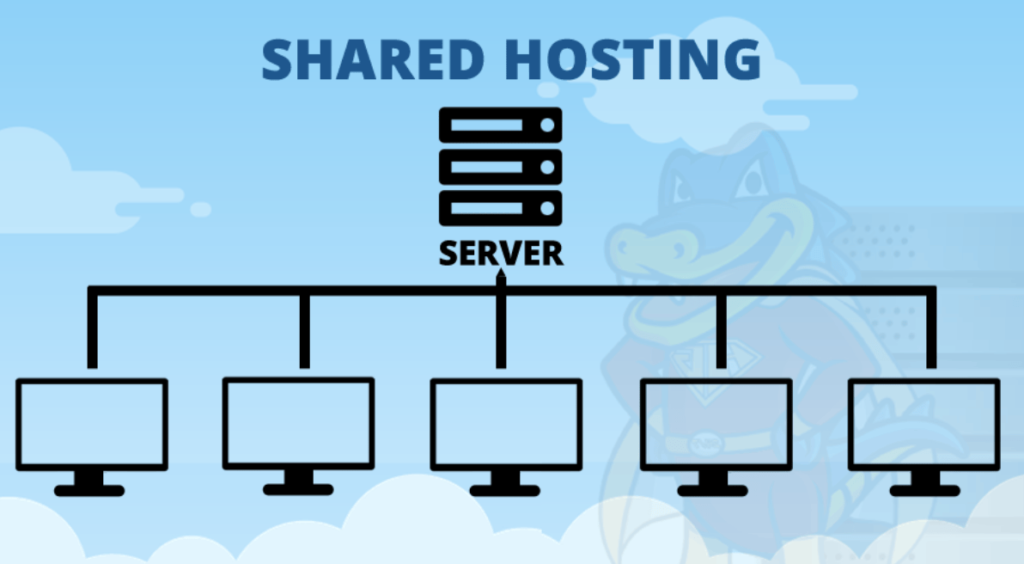
That’s how shared hosting remains so cheap. By splitting resources, it’s less cost for the web host.
As such, each website on the server will have a limited amount of resources as defined by their specific hosting plan.
Think of it as renting an apartment with roommates. You have your own bedroom, but you and your roommates will share resources like water, electricity, and common spaces throughout the house.
The nature of sharing a server with other websites has its drawbacks. If another website on your server has a traffic spike, it can potentially cause performance issues with your site. These situations are out of your control.
So while shared hosting is a great option if you want to save some money, it definitely won’t deliver the most high-quality web hosting experience for you or your website visitors.
Who is Shared Hosting For?
Shared hosting is a great choice for beginners and smaller websites. It’s cost-effective and doesn’t require lots of technical knowledge to get started.
I’d recommend shared web hosting to websites that are on a tight budget. Bloggers and small business owners who have simple websites are great candidates for shared hosting. Any website that doesn’t require too much on-site interaction or lots of resources will be fine with this hosting type.
If you’re not expecting more than 10,000 or 20,000 monthly visits to your website, you can save some money by selecting a shared web hosting plan.
Shared web hosting pros:
- Most cost-effective type of web hosting.
- Easy to set up.
- No technical knowledge required.
- Great for beginners and small websites.
Shared web hosting cons:
- Sharing server resources with other websites.
- Performance issues are out of your control.
- Slower loading times and lower uptime rates.
- Not scalable.
Best Shared Web Hosting Provider — Bluehost
Our recommendation for shared hosting is Bluehost. So if it sounds like shared hosting is the best option for your website, this is the most logical place to start your search.
This provider has an outstanding reputation in the industry. More than 2 million websites across the globe trust Bluehost for web hosting.
Bluehost offers shared hosting plans starting as low as $2.95 per month.
All plans come with a free domain, free SSL certificate, and free marketing credits for Google Ads and Microsoft Advertising.
If you have questions, problems, or need any assistance, you can contact Bluehost support 24/7 via phone or live chat.
VPS Hosting
VPS stands for “virtual private server.” This hosting type is a step above shared web hosting. When a website outgrows their shared plan, it’s common for owners to upgrade to a VPS.
With a virtual private server, your website will still be sharing a single server with other websites. However, the number of websites you’ll be sharing it with is significantly lower.
The main server is split into multiple virtual servers—hence the name. These virtual servers can be customized by individual websites.
Even though the main server is shared with other sites, your website will have dedicated resources with a VPS.
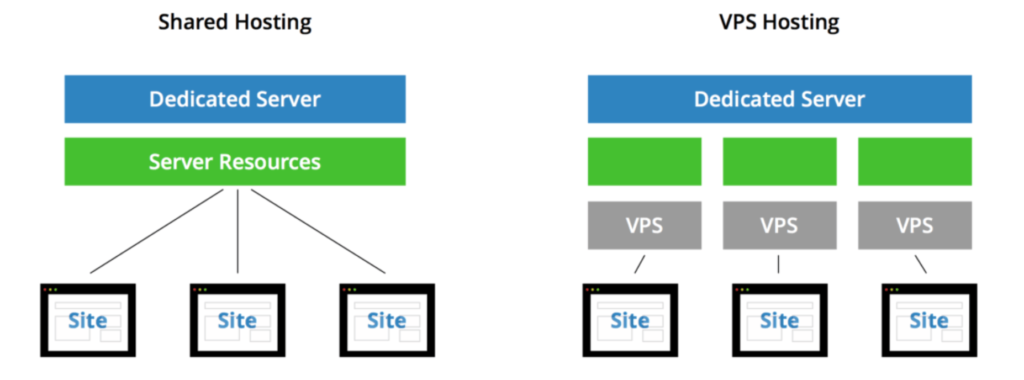
For those of you who want to run custom configurations to your server, you can get optional root access with your VPS hosting plan.
You site will generally perform better since you aren’t sharing resources. This means you’ll benefit from faster loading times and higher uptime rates. You won’t have to worry about another website causing your site to crash.
Most websites do not need a dedicated server (we’ll get to that next). But a VPS gives you some of the benefits of dedicated hosting at a fraction of the price.
A virtual private server is like renting an apartment on your own. You won’t be sharing a kitchen, bathroom, living room, or other common spaces with any roommates. This gives you much more freedom and flexibility to do what you want with the space.
However, you’ll be sharing some resources with the other units in the building. So there will still be some limitations.
Who is VPS Hosting For?
VPS hosting is best for small or medium-sized businesses that can’t afford to have unexpected downtime on their website. It’s a great option for website owners who have outgrown the resources of a shared hosting plan.
A virtual private server can benefit website owners who are tech-savvy and want to make custom changes to their server configuration.
Websites with large files like videos and images should consider a VPS. Interactive websites with complex files will perform better on a VPS as opposed to a shared server.
VPS hosting pros:
- Dedicated server resources.
- Ability to make custom configurations to your server.
- Higher uptime rates and faster loading speeds.
- More cost-effective than a dedicated server.
VPS hosting cons:
- Sharing the main server with other websites.
- Not as easy to set up as a shared server.
- Still has limitations in terms of what you can control.
Best VPS Hosting Provider — InMotion
Lots of hosting providers offer VPS plans, but InMotion is our top recommendation for this type of web hosting.
The VPS plans offered by InMotion come with root access, which gives you the ability to make custom changes to your virtual server. This is a great option for those of you who are more technically advanced.
InMotion offers free cPanel and WHM, making it easy for anyone to view and manage their VPS.
You’ll also have the option to choose your data center for maximum speed. InMotion has VPS plans that are optimized for ecommerce shops as well.
All VPS plans from InMotion come with a 90-day money-back promise, which is one of the best satisfaction guarantees that you’ll find in the industry.
WordPress Hosting
WordPress hosting optimizes for WordPress as your content management system.
You’ll normally see two different types of WordPress hosting offered by providers.
- Shared WordPress hosting
- Managed WordPress hosting
Shared WordPress hosting works the same way as regular shared hosting, except WordPress might be pre-installed.
Managed WordPress hosting provides added benefits like enhanced security, server caching, staging, and faster loading speeds.
The best WordPress hosting plans come with one-click WordPress installations as well.
WordPress hosting usually has added security that’s specifically designed for websites that are running on WordPress. Since WordPress is the most commonly used CMS across the globe, those websites are a higher risk for cyber crime. So that added security is definitely a great benefit.
Who is WordPress Hosting For?
This isn’t rocket science. WordPress hosting is for WordPress users. If you want your hosting to be optimized for your WordPress site, then you should look into this type of web hosting.
WordPress hosting pros:
- Optimized for WordPress.
- WordPress pre-installed or one-click installations.
- Enhanced security for WordPress sites.
WordPress hosting cons:
- Less control and flexibility.
- Updates aren’t always smooth.
- Sharing resources with other WordPress sites.
Best WordPress Hosting Provider — WP Engine
I should start by saying I’m a little biased here. We use WP Engine here at Quick Sprout, so naturally, this is my top pick for the category.
It’s not necessarily the best choice for beginners. But for those of you who have some experience with web hosting and plan to build a blog or business website with high-traffic, WP Engine is your best bet.
WP Engine has WordPress hosting plans starting at $30 per month. This is another reason why I don’t think it’s the best choice for a beginner. There are other WordPress hosting plans out there starting for less than $5 or $10 per month.
The speed and security is the best part of WP Engine. They offer managed WordPress hosting services, so everything is handled at the server level.
This means that you won’t have to install lots of extra plugins that can weigh your site down.
Another reason why I recommend WP Engine is because they have excellent customer support. All plans come with 24/7 live chat, and some of the higher-tier plans even come with 24/7 phone support.
I’ve been impressed with the quality and level of service whenever I’ve needed to contact them.
Dedicated Hosting
Dedicated servers are typically considered the best choice in web hosting. That’s because you have a dedicated server that belongs to you, and you alone. You typically get more benefits with dedicated hosting too such as more uptime and faster speeds.
However, it comes with a catch: This is the most expensive type of web hosting.
Since you won’t be sharing resources or anything else with other websites, your site will operate at peak performance.
Websites being hosted on a dedicated server have complete technical control over the server settings. You choose the software, configurations, and anything else you need.
If you get a dedicated server, you should expect extremely high uptime rates and lightning fast loading speeds. You won’t have to worry about traffic from other websites impacting your performance.
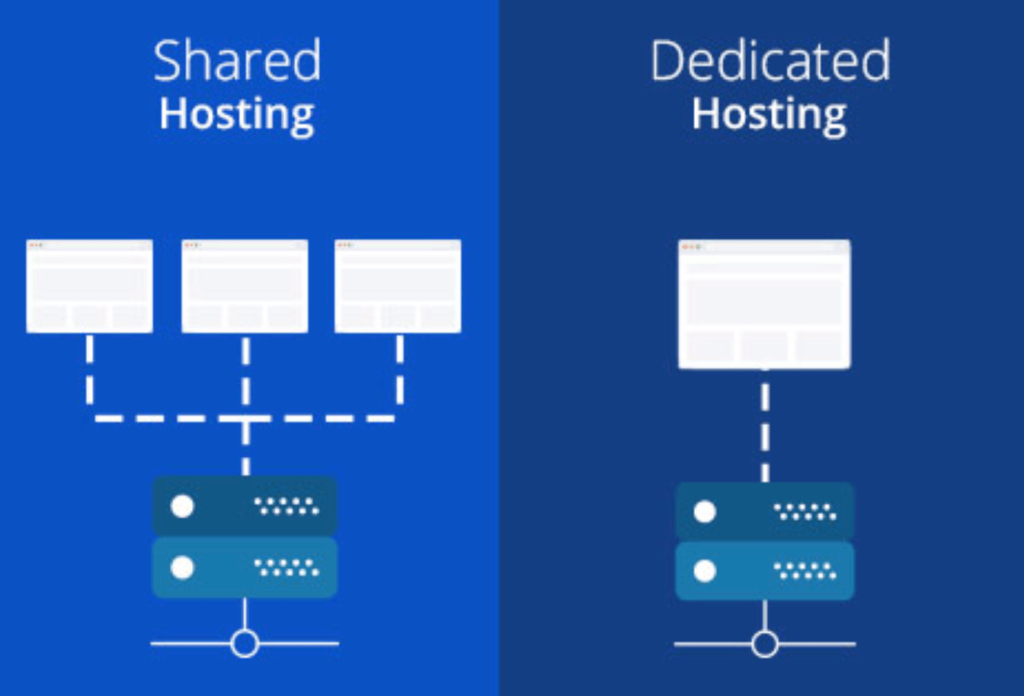
A dedicated server is like owning a house. If you want to build a fence, plant a tree in the yard, build a patio, or renovate the kitchen, everything is completely up to you.
Who is Dedicated Hosting For?
Dedicated hosting plans are typically reserved for enterprise-level websites. That means more than 100,000 monthly visits — not to mention plenty of revenue coming in to afford the server.
Don’t even consider this type of hosting if you’re still struggling to pull in a few thousand in traffic each month.
Large ecommerce sites and enterprises should consider a dedicated hosting plan because they can have complete control over the functions of their server. Sites that require the highest levels of security, such as websites that store financial data or medical information would benefit from a dedicated server.
Dedicated servers come with varying management levels. You can look for a hosting provider that will manage your server for you, or you can manage it on your own. The downside of managing the server on your own is that you’ll be responsible for installing updates and monitoring everything for glitches or errors.
Only consider a dedicated server if you can afford it. In most cases, a dedicated hosting plan will be out of your price range, especially if you are starting a new website. These servers can cost up to $2,000 per month.
Dedicated hosting pros:
- Complete control over the server.
- Not sharing resources with any other websites.
- High security.
- Fast load times, high uptimes, and optimal performance.
Dedicated hosting cons:
- Most expensive type of web hosting.
- Requires technical knowledge.
- You are responsible for everything.
Best Dedicated Hosting Provider — HostGator
HostGator is my top recommendation for dedicated server plans. While dedicated hosting definitely isn’t cheap, the plans offered by HostGator are actually pretty affordable.
Introductory pricing specials for their dedicated servers start at $118.99 per month.
One of the reasons why I like HostGator is because they offer fully managed plans. If you want, their team of technicians can handle system monitoring, software patching, updates, offsite backups, data migrations, and more.
You’ll have access to 24/7/365 priority customer support as well.
So if you think your website needs a dedicated server, check out the plans and options offered by SiteGround.
Cloud Hosting
Cloud hosting is like a hybrid version of a VPS—but more cost-effective.
Cloud hosting plans come with multiple remote servers. Each server has different responsibilities. If one of the servers is compromised or has a problem, the other servers on the network will take over those responsibilities and pick up the slack.
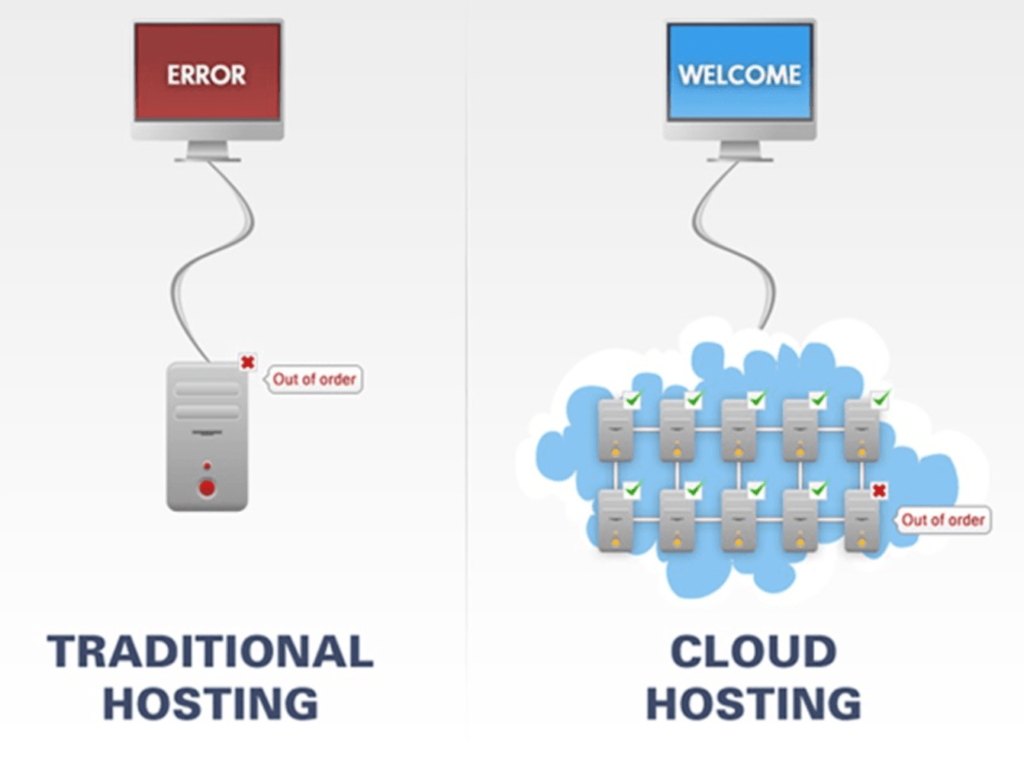
That’s what makes cloud web hosting such an appealing alternative to traditional web hosting.
With cloud servers, your website will have higher uptime rates and won’t have as much unexpected downtime due to server errors. Your site will remain fluid and perform at a high level.
The best part about cloud web hosting is scalability.
With traditional hosting, there is always a constant dilemma between server resources and price. You don’t want to overpay for a plan with resources that you’ll never use, but at the same time, you don’t want to exceed the resources of a lesser plan and negatively affect the performance of your website.
Unless you know exactly how many page views your site will get per month, then this is nearly impossible to predict.
But website traffic is never an exact science. At times, you’ll experience spikes or surges to your site—which is great news. You just need to make sure your plan can accommodate that traffic.
That’s why cloud hosting is the ultimate solution to this dilemma. The best cloud hosting plans allow you to scale your resources on-demand.
You pay for what you use, and you can always adjust these resources within your admin dashboard.
Who is Cloud Hosting For?
Cloud hosting is the best option for medium and large business websites that are growing at a rapid rate.
If your website traffic is unpredictable and you’re planning on it scaling at a steady rate in the coming months or years, then you should consider a cloud hosting plan.
Any website with more than 50,000 monthly page visits could consider a cloud plan. Websites that have outgrown their shared plan and need to upgrade could seek cloud hosting as an alternative option to a VPS.
Cloud hosting pros:
- High security.
- Scale resources on demand.
- Less unexpected downtime.
Cloud hosting cons:
- Pricing isn’t always fixed.
- Unpredictable traffic can increase costs.
- Limited customization.
Best Cloud Hosting Provider — SiteGround
If you’re interested in cloud hosting, look no further than SiteGround. Siteground has always been an industry leader in web hosting. Their cloud plans are suitable for a wide range of businesses and website sizes.
Their entry-level cloud plans come with 2 CPU cores, 4 GB of memory, and 40 GB of SSD space. But you can fully customize a cloud with up to 32 CPU cores, 128 GB of memory, and 1 TB of SSD space. Although most of you won’t need all of that, it’s nice to know you have those customizable options to deliver exactly what your website requires.
SiteGround’s cloud plans are fully managed. Their IT team will take care of all of the technical aspects of your hosting experience. This allows you to focus on everything else.
All cloud plans come with a free SSL, free CDN, private DNS, and daily backups. You’ll also benefit from SiteGround’s advanced priority support if you ever need assistance.
Reseller Hosting
Reseller hosting involves selling hosting services to clients. As such, it is definitely not for everyone. If you’re building a small website from scratch or just looking to host a website on your own, you’ll want to look elsewhere.
But if you want to sell web hosting to other sites, then you should look into reseller hosting plans.
Reseller hosting is basically white label web hosting. You buy hosting from a provider and then resell those services to your clients.
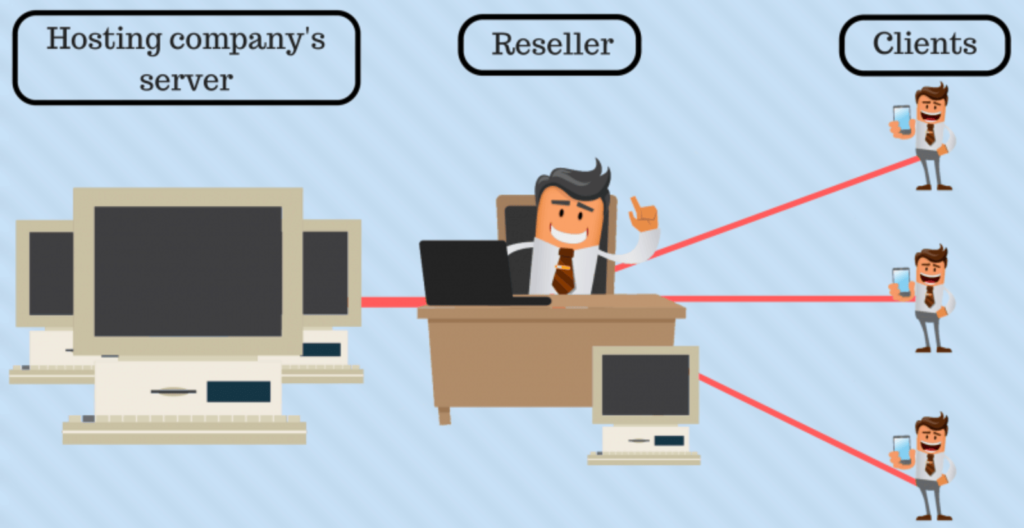
As the reseller, you get to choose the pricing options for your clients. Since you’ll be paying wholesale rates to the provider, then you have the opportunity to make substantial profit margins.
Who is Reseller Hosting For?
For the most part, reseller hosting is for agencies, web designers, and web developers. These are people who already have clients in this space, so they can just add web hosting to the services that they currently offer.
You can make it easy on your clients by allowing them to get all of their website needs in one place, as opposed to finding a web hosting plan on their own.
One of the best parts about being a reseller is sustainability. If you design a website for someone, they won’t necessarily need your services forever. But if you can get those clients to buy web hosting services from you, then you’ll benefit from a steady monthly income for the lifetime of that website.
I wouldn’t consider reseller hosting unless you’re planning to manage at least 10 different websites. Otherwise, it probably won’t be worth it for you.
Reseller hosting pros:
- Set uncapped prices to your clients.
- Get recurring and sustainable income.
- Improve your existing services.
Reseller hosting cons:
- Need lots of clients to make it worth your time and effort.
- If something goes wrong, your clients will turn to you.
Best Reseller Hosting Provider — A2 Hosting
A2 Hosting is known for speed, which is one of the reasons why it’s my top recommendation for reseller hosting.
When you white label hosting to your clients, you want to make sure that you deliver high performance. Even though the hosting technically isn’t coming from you, any problems will be a poor reflection of your personal brand. But with A2 Hosting, your clients will still get high uptime rates and fast loading speeds on a shared server.
Another top benefit of A2 Hosting is that WHMCS comes free with all reseller plans. You’ll definitely need this to effectively manage all of your clients and their resources. Other hosting providers charge extra for this.
Overall, client management with A2 Hosting is the best I’ve seen in the industry. You can even set up simple hosting support as well.
A2 Hosting also offers a 99.9% uptime commitment to you. So you can pass that along to your customers.
What is the Best Hosting Type For Your Website?
This answer will be different for everyone. What works for one business, might not be good for you.
It all depends on factors like the type of website you have, the resources you need, your budget, and traffic.
Once you know what you need though, then you can start making a decision. I gave my top recommendation for each category in this guide, so that’s the best place for you to start your search.
To figure out what category you fall in, here’s a quick recap of the different hosting types and who they are for:
- Shared Hosting — Most cost-effective plans for entry-level websites. – Recommended Shared Host = BlueHost
- VPS Hosting — For websites that have outgrown shared hosting. – Recommended VPS Host = InMotion
- WordPress Hosting — Hosting optimized for WordPress sites. – Recommended WordPress Host = WP Engine
- Dedicated Hosting — Enterprise-level servers for large websites. – Recommended Dedicated Host = HostGator
- Cloud Hosting — Best for websites that are growing rapidly. – Recommended Cloud Host = Siteground
- Reseller Hosting — For agencies, web developers, and web designers. – Recommended Reseller Host = A2 Hosting
from Quick Sprout https://ift.tt/2NjdV4l
via IFTTT






No comments:
Post a Comment